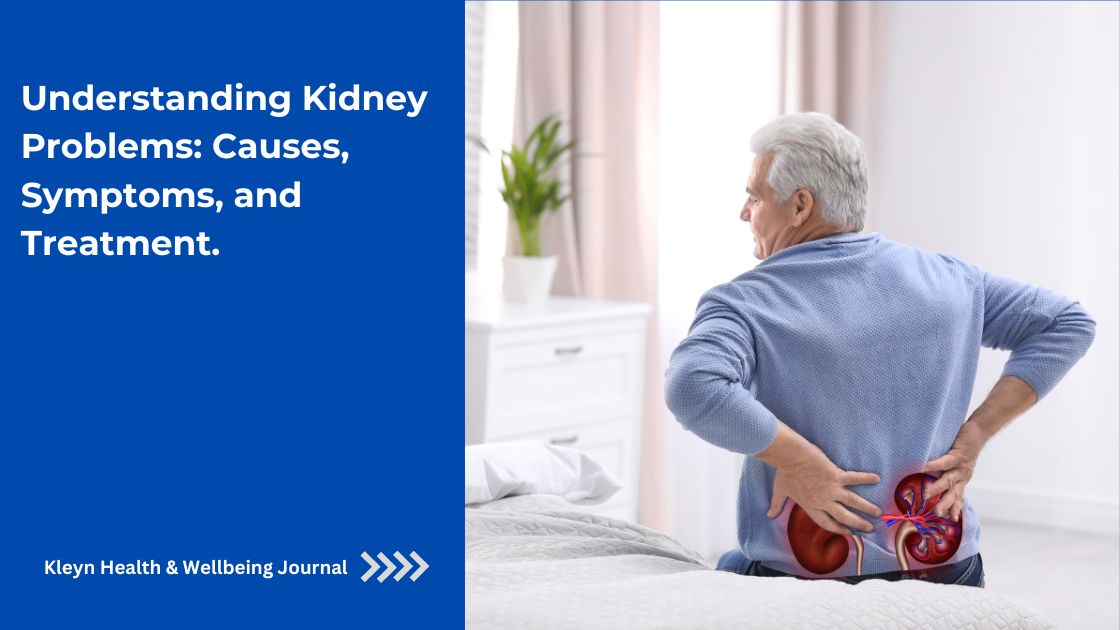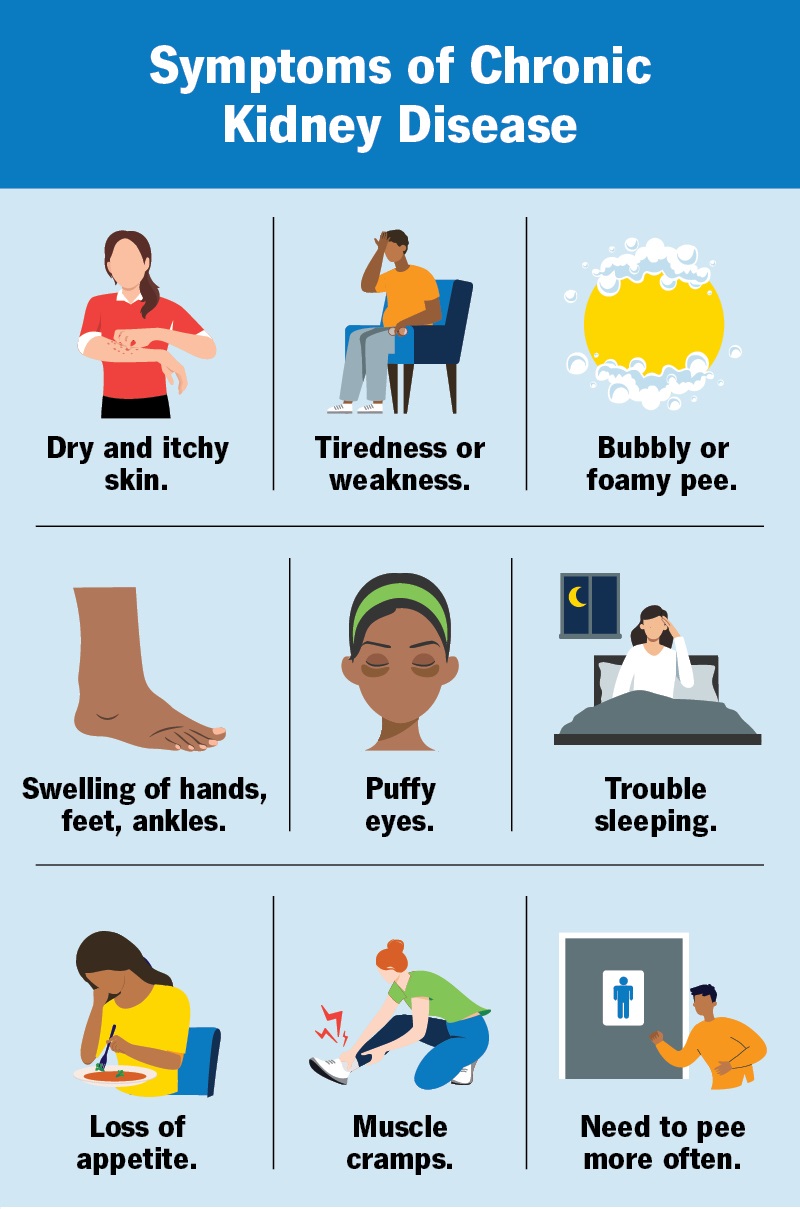
Kidney problems are a serious health concern that affect millions of people worldwide. The kidneys are vital organs responsible for filtering waste and excess fluids from the blood, maintaining electrolyte balance, and regulating blood pressure. When they don't function properly, it can lead to significant health issues. In this blog, we'll discuss the causes, symptoms, and treatment options for kidney problems, and explore how Kleyn Healthcare can support individuals with kidney-related health concerns.
What Are the Kidneys and What Do They Do?
The kidneys are two bean-shaped organs located on either side of your spine, just below your rib cage. Each kidney contains around one million tiny filters called nephrons, which are responsible for filtering the blood. Their key functions include:
-
Removing Waste and Excess Fluid: Kidneys filter out waste products and excess fluids, which are then passed out of the body as urine.
-
Regulating Blood Pressure: By managing fluid balance and producing hormones like renin, kidneys play a critical role in maintaining healthy blood pressure.
-
Balancing Electrolytes: Kidneys regulate the levels of key electrolytes such as sodium, potassium, and calcium in the body.
-
Supporting Red Blood Cell Production: Kidneys produce erythropoietin, a hormone that stimulates the production of red blood cells.
When the kidneys fail to function correctly, waste and fluids build up in the body, leading to potentially life-threatening complications.
Common Causes of Kidney Problems
Kidney problems can arise from a variety of factors, including underlying medical conditions, lifestyle habits, and genetic predisposition. Here are some of the most common causes:
-
Chronic Kidney Disease (CKD): This long-term condition is characterised by the gradual loss of kidney function over time. CKD is often caused by diabetes, high blood pressure, or glomerulonephritis (inflammation of the kidney's filtering units).
-
Kidney Stones: These are hard deposits of minerals and salts that form in the kidneys and can cause severe pain and blockage of urine flow.
-
Acute Kidney Injury (AKI): Sudden kidney failure, often caused by injury, severe infection, or dehydration, can lead to AKI. It can occur in a matter of hours or days.
-
Polycystic Kidney Disease (PKD): A genetic condition where cysts form in the kidneys, leading to enlargement and impaired function.
-
Urinary Tract Infections (UTIs): If left untreated, UTIs can spread to the kidneys and cause infections known as pyelonephritis, which can damage kidney tissues.
-
Glomerulonephritis: This condition involves inflammation of the tiny filters in the kidneys (glomeruli), often caused by infections, autoimmune diseases, or toxins.
-
Obstructions: Tumors, kidney stones, or an enlarged prostate can block the flow of urine, leading to kidney damage.
Symptoms of Kidney Problems
Kidney problems can manifest in various ways, depending on the underlying cause and severity. Some people may experience mild symptoms, while others may have more severe signs of kidney dysfunction. Common symptoms include:
-
Swelling (Edema): Fluid retention in the legs, ankles, and feet, or puffiness around the eyes due to the kidneys’ inability to remove excess fluid.
-
Changes in Urination: This can include difficulty urinating, an increase or decrease in the frequency of urination, foamy urine, or blood in the urine.
-
Fatigue: Kidneys play a role in red blood cell production, and kidney problems can lead to a drop in oxygen-carrying red blood cells, causing tiredness and weakness.
-
High Blood Pressure: Poor kidney function can lead to increased blood pressure, which, in turn, can further damage the kidneys.
-
Loss of Appetite and Nausea: The buildup of toxins in the blood can cause nausea, vomiting, and a general loss of appetite.
-
Back or Side Pain: Pain in the lower back or side can be a sign of kidney stones, infections, or other issues affecting the kidneys.
-
Itching and Dry Skin: When waste builds up in the blood, it can cause dry, itchy skin.
If you experience any of these symptoms, it's important to seek medical attention as soon as possible.
Diagnosing Kidney Problems
Diagnosis of kidney problems typically involves a combination of medical history, physical examination, and diagnostic tests. These tests help healthcare professionals determine the type and severity of the kidney issue. Common diagnostic methods include:
-
Blood Tests: Tests like serum creatinine and blood urea nitrogen (BUN) levels can help assess how well the kidneys are functioning. Elevated levels of these substances indicate kidney impairment.
-
Urine Tests: Urinalysis can detect abnormal levels of protein, blood, or other substances in the urine, which may signal kidney problems.
-
Imaging Tests: Ultrasounds, CT scans, or MRIs can provide detailed images of the kidneys and detect blockages, cysts, or tumors.
-
Biopsy: In some cases, a kidney biopsy (removal of a small tissue sample) may be required to diagnose specific kidney diseases or determine the extent of damage.
Treatment Options for Kidney Problems
The treatment of kidney problems depends on the underlying cause and severity. Here are some common treatment options:
-
Lifestyle Changes: For individuals with early-stage kidney disease, making changes to diet, exercise, and hydration can slow the progression of the disease. Reducing salt and protein intake, staying hydrated, and controlling blood sugar and blood pressure levels are crucial.
-
Medications: Certain medications can help manage kidney disease, including blood pressure medications (ACE inhibitors or ARBs), diuretics to reduce swelling, and medications to manage underlying conditions like diabetes.
-
Dialysis: For individuals with end-stage kidney disease, dialysis may be necessary. Dialysis is a treatment that mimics the kidneys' function by filtering waste and excess fluids from the blood.
-
Kidney Transplant: In cases of severe kidney failure, a kidney transplant may be the best option. This involves replacing the damaged kidney with a healthy donor kidney.
-
Treating Kidney Stones: Small kidney stones may pass naturally with increased fluid intake, while larger stones may require medications, shockwave therapy, or surgery to remove them.
Preventing Kidney Problems
Preventive measures can significantly reduce the risk of developing kidney problems. Here are some steps to keep your kidneys healthy:
-
Stay Hydrated: Drinking plenty of water helps flush toxins and waste products from the kidneys, reducing the risk of kidney stones and infections.
-
Monitor Blood Pressure and Blood Sugar: Managing these factors is crucial, especially for those with diabetes or hypertension, as they are major risk factors for kidney disease.
-
Maintain a Healthy Diet: A balanced diet that is low in salt, processed foods, and excessive protein can protect the kidneys. Incorporating fruits, vegetables, and whole grains supports kidney health.
-
Avoid Overuse of Painkillers: Prolonged use of nonsteroidal anti-inflammatory drugs (NSAIDs) like ibuprofen can damage the kidneys.
-
Get Regular Check-ups: Routine blood and urine tests can detect early signs of kidney problems, allowing for early intervention and management.
How Kleyn Healthcare Can Help
At Kleyn Healthcare, we are committed to helping individuals manage and treat kidney-related health concerns. Our experienced healthcare professionals provide personalised care, from early diagnosis to long-term management. We offer diagnostic tests, treatments, and support for a range of kidney conditions, ensuring that patients receive the highest standard of care.
Whether you're dealing with chronic kidney disease, kidney stones, or simply want to monitor your kidney health, Kleyn Healthcare is here to assist you every step of the way. We offer comprehensive healthcare services tailored to your unique needs, ensuring that you receive the best possible care for your kidneys and overall health.
Conclusion
Kidney problems can be serious, but with the right care and management, many kidney conditions can be controlled or even prevented. Recognising the symptoms, understanding the causes, and seeking prompt treatment are essential steps in maintaining kidney health. If you have concerns about your kidney health, don't hesitate to reach out to a healthcare provider.
At Kleyn Healthcare, we are dedicated to providing expert care for kidney health and supporting individuals in achieving optimal well-being.



